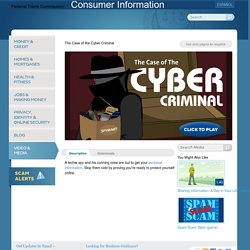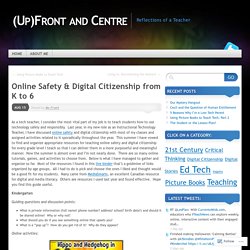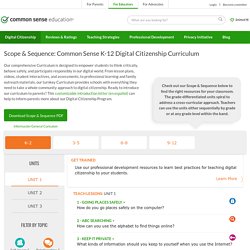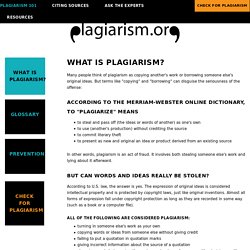

1000+ images about Digital Citizenship on Pinterest. The Case of the Cyber Criminal. Jump to Navigation Federal Trade Commission Consumer Information español Search form Scam Alerts Vea esta página en español The Case of the Cyber Criminal You Might Also Like Sharing Information: A Day in Your Life (video) Many everyday activities allow businesses access to information about you.

Tags: behavioral advertising, online, personal information, privacy, sharing, social networking Spam Scam Slam (game) Can you spot spam scams? Tabs A techie spy and his cunning crew are out to get your personal information. Get Updates by Email > Looking for Business Guidance? The Federal Trade Commission (FTC) is the nation’s consumer protection agency. Share Our Resources. File a Complaint with the FTC > Online Safety & Digital Citizenship from K to 6. As a tech teacher, I consider the most vital part of my job is to teach students how to use technology safely and responsibly.

Last year, in my new role as an Instructional Technology Teacher, I have discussed online safety and digital citizenship with most of my classes and assigned activities related to it sporadically throughout the year. This summer I have vowed to find and organize appropriate resources for teaching online safety and digital citizenship for every grade level I teach so that I can deliver them in a more purposeful and meaningful manner. Now the summer is almost over and I’m not nearly done. There are so many online tutorials, games, and activities to choose from.
Below is what I have managed to gather and organize so far. Kindergarten. Scope & Sequence: Common Sense K-12 Digital Citizenship Curriculum. Get Trained Use our professional development resources to learn best practices for teaching digital citizenship to your students.

Onboard Students: Digital Passport Introduce students in grades 3-5 to Digital Passport, our award-winning suite of games that help onboard students to the foundational skills of digital citizenship and Internet safety. Teach Lessons: Unit 1 Teach Lessons: Unit 2 5 - Picture Perfect How can photos be changed on the computer, and how can that affect your feelings about the way you look? Teach Lessons: Unit 3 Extend Learning: Digital Bytes Challenge teens to take a real-world look at digital citizenship through student-directed, media-rich activities in Digital Bytes. Give Assessment. Kahoot! 9 resources for teaching digital citizenship. Teaching Kids about Copyright & Piracy Video. 10 Must Have Resources to Teach about Copyright and Fair Use. 1- Copyright Advisory Network This web site is a way for librarians to learn about copyright and seek feedback and advice from fellow librarians and copyright specialists 2- Copyright and Fair Use Guidelines for Teachers This chart was designed to inform teachers of what they may do under the law.

Feel free to make copies for teachers in your school or district, 3- Copyright Confusion This is a great wiki where you can have access to materials, PDFs, and guide on copyright and fair use of digital content 5- Creative Commons Creative Commons is a nonprofit organization that enables the sharing and use of creativity and knowledge through free legal tools. 6- CyberBee I must say that this is really a great interactive website that teaches students everything on copyright issues. 7- Fair Use Evaluator This tool helps you better understand how to determine the "fairness" of a use under the U.S. 8- Taking The Mystery out of Copyright.
Teaching Copyright. What is Plagiarism? — Plagiarism.org - Best Practices for Ensuring Originality in Written Work. Many people think of plagiarism as copying another's work or borrowing someone else's original ideas.

But terms like "copying" and "borrowing" can disguise the seriousness of the offense: According to the Merriam-Webster Online Dictionary, to "plagiarize" means to steal and pass off (the ideas or words of another) as one's ownto use (another's production) without crediting the sourceto commit literary theftto present as new and original an idea or product derived from an existing source In other words, plagiarism is an act of fraud. It involves both stealing someone else's work and lying about it afterward. But can words and ideas really be stolen?
According to U.S. law, the answer is yes. All of the following are considered plagiarism: Most cases of plagiarism can be avoided, however, by citing sources. What about images, videos, and music? Using an image, video or piece of music in a work you have produced without receiving proper permission or providing appropriate citation is plagiarism. Copyright and Fair Use. Copyright Basics. Copyright, What's Copyright? Create a Comic. Storyboard Creator.